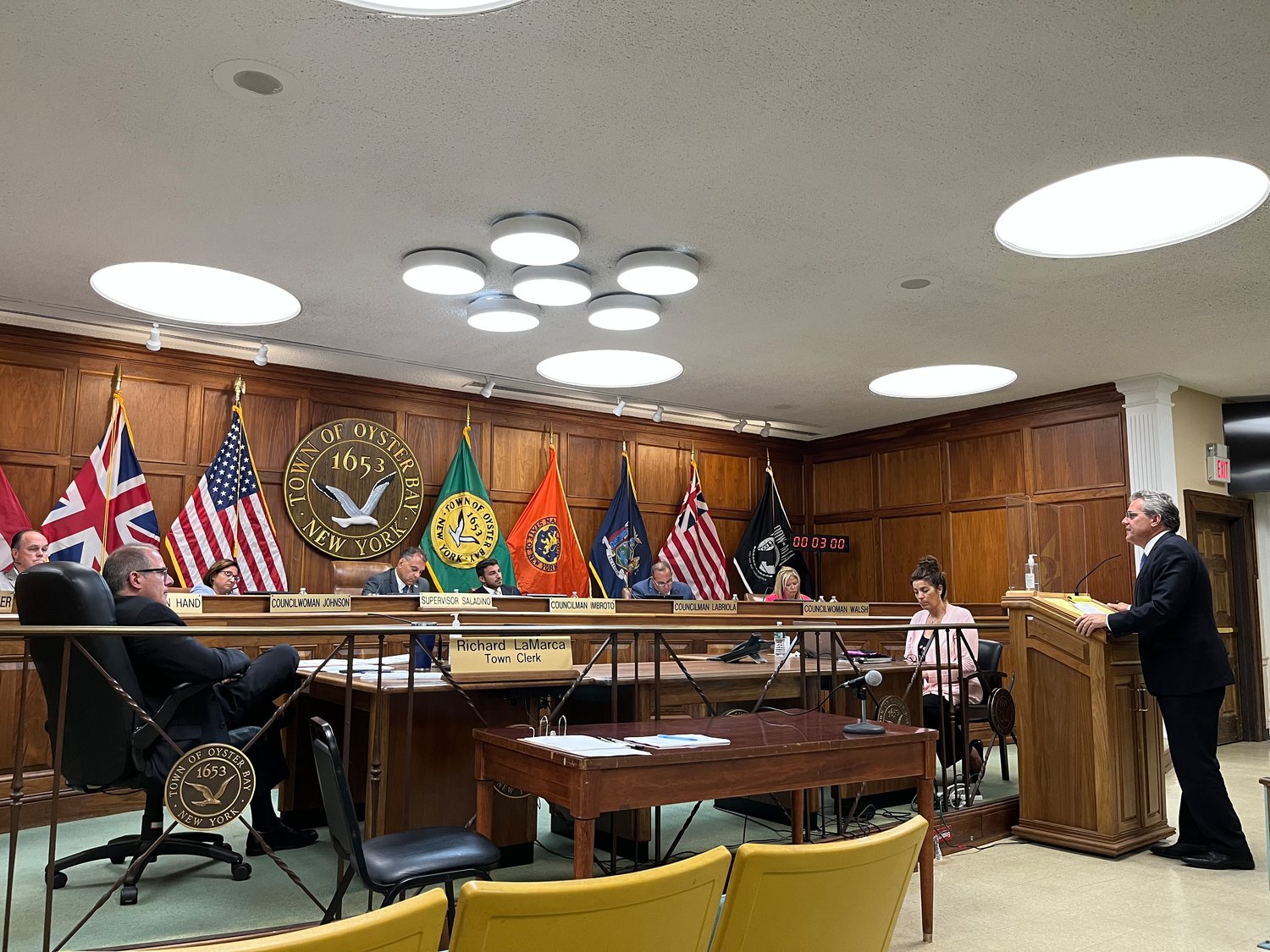Town of O.B. officials claim new bureau will be beneficial
The Town of Oyster Bay is moving forward with its plan to create a Bureau of Administrative Adjudication, a court that would cover misdemeanor level cases. Residents, concerned parties and elected leaders are divided, however, on whether the new bureau would cause more harm than good.
The bureau would be created to circumvent the state criminal discovery laws requiring anyone reporting a misdemeanor to publicly disclose their name. Numerous town superintendents oppose these laws, claiming they discourage people from coming forward.
“If the witness, the resident, is not allowed to remain anonymous, we have been told that there will be far less complaints because people are not only afraid of reprisal, but of an uncomfortable situation with a neighbor,” Town Supervisor Joseph Saladino said during a town board meeting on Tuesday where the proposal was discussed. “We end up in a dangerous condition because residents are afraid to come forward; it becomes a Hatfields and McCoys situation.”
The bureau is designed around the model of nearby municipalities, such as Huntington, which created its own similar bureau less than a year after the discovery laws were passed in 2019. The bureau would allow the town supervisor to appoint a director and three judges to try misdemeanor civil suits in-house, rather than sending residents to the state court in Hempstead.
The town tried to pass similar legislation in 2021 through the State Senate and Assembly, but their case was rejected.
More importantly, according to town attorney Frank Scalera, it would mean that the judges would be people from Oyster Bay, having a more personal understanding of issues specific to the town.
“The fact of the matter is you have judges that are elected from other parts of Nassau County adjudicating or sitting over cases having to do with our own residents,” Scalera said.
Others maintain the new bureau is an attempt by the town board to consolidate power over the judiciary system in their district. Assemblyman Chuck Lavine, whose district includes the hamlet and other parts of the town, expressed his opposition to the legislature, on the grounds that it undercuts the criminal discovery laws of 2019, but also that it will cost taxpayers while serving as a cash cow for town government.
“The town is going to assess fines and surcharges on anyone and everyone who is found to be not in compliance with zoning or local ordinances,” Lavine said. “The town is also going to appoint a director at a substantial salary and at least three judges at a substantial salary, and those judges are going to need staff and personnel and that amounts to additional expenses to the town. In addition to that, the town doesn’t have the 300,000 to 350,000 residents that are required under the law to institute any such adjudication bureau on its own.”
Brian Nevin, the town’s public information officer, said the town reached the 300,000 resident milestone, citing the 2020 census for the county, which listed it at 301,229 in 2020. However, in 2021 that number was reduced to 299,583. Scalera asserted during the board meeting that once they had reached the required population, the town was still in its rights to press forward with the bureau.
Nevin claimed opposition by Lavine, a Democrat, was purely political in nature. He alleged the assemblyman supported the creation of similar bureaus in Huntington and Babylon because they were run by Democrats. Lavine said that he would not dignify that assertion with a response.
Nassau County’s chapter of the American Civil Liberties Union expressed concern regarding the creation of the bureau, believing it infringes on residents’ rights of making reporting of crimes anonymous, He added that it consolidates too much judicial power under the executive and legislative branches of local government.
“Last year, NYCLU submitted its rejection to the establishment of administrative adjudication bureaus in several municipalities, including Oyster Bay, because they establish courts that hear violations of town codes,” Susan Gottehrer, the chapter’s director said. “But by bypassing important due process protections, such as witness identification and pretrial discovery requirements, any bureau or tribunal has the power to create financial hardships and serve monetary penalties which could result in the loss of shelter, vehicle, livelihood or the loss of licensing.”

 54.0°,
Fair
54.0°,
Fair 





